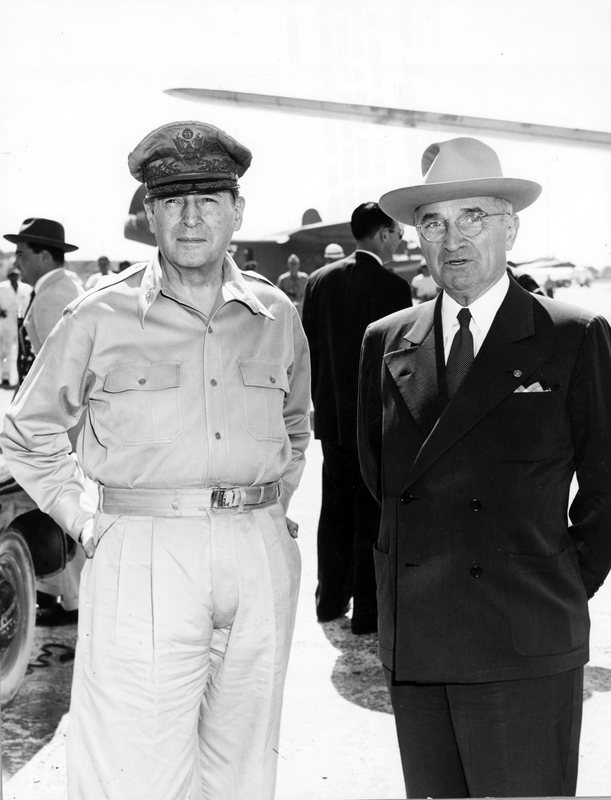Tiffin, Ohio (Special to Informed Comment; Feature) – No sooner had the announcement about a new policy for Ukraine from the Trump administration been made than the cries of “appeasement! Munich! Hitler! Neville Chamberlain” began to ring out from almost all corners of the mediaverse.
The lessons to be learned from the events in Munich in 1938, in which Prime Minister Chamberlain signed off on the Nazi seizure of Czechoslovakia, are of course relevant, but they have also been used to justify all manner of wars and violence that have had little justification, as Juan Cole pointed out two decades ago. Perhaps even worse, the Munich analogy has been used to justify the refusal to negotiate with adversaries.
Were it up to me, I would banish that analogy from the English lexicon. I will briefly explain my reasoning.
The Munich appeasement analogy was widely used during the Korean War, but by no one more forcefully than General Douglas MacArthur, in charge of United Nations forces in Korea, who used it to press for a total war in the region against North Korea and their Chinese allies. This would have required a full war mobilization of the United States and very likely the use of nuclear weapons.
Both Truman and the US Joint Chiefs of Staff balked at paying such a price, and did not much appreciate the Munich analogy being used as a club against them. MacArthur was called home and fired in April of 1951. It is now generally accepted that Truman and the Chiefs were correct in rejecting both a wider war and the analogy being used to justify it.
At dawn on the morning of October 15th, President Harry S. Truman is met at Wake Island by Far East Commander General Douglas MacArthur. October 15, 1950. Accession Number 67-434. Public Domain. H/t Picryl.
A little more than ten years later the Munich analogy again came into play during the Cuban Missile Crisis of 1962. Air Force Chief General Curtis LaMay thought that a general war with the Soviet Union was inevitable, and pushed President John Kennedy to approve it. Kennedy, in fact, was a big fan of the Munich analogy himself and had written a best selling book with that as the theme. At a crucial meeting as the crisis was going on, LeMay said, “I don’t see any other solution. It will lead right into war. This is almost as bad as the appeasement at Munich.”
Fortunately for the planet, Kennedy balked, and managed to end the crisis short of all-out war. Most of us are glad that he did.
And then there was the Invasion of Iraq in 2003. If the abuse of analogies was a criminal offense, the George W. Bush administration would have received the maximum sentence. Saddam Hussein was a cruel dictator indeed, but claiming that he had weapons of mass destruction nearly ready to use was preposterous and quickly debunked by weapons inspectors and the media. But the Munich analogy served its purpose, in this case rallying support for a disastrous war, and the refusal to negotiate.
What we have here are good examples of the Munich analogy being misused. And there were others, in Vietnam, Central America, and more.
That brings us to the Russia-Ukraine war, the largest and most brutal conflict in Europe since the end of World War Two. After almost three years of war, Ukraine is in a bad way. They are being slowly pushed back in the East, and have a severe shortage of soldiers. Desertions of troops are common, including among those who have spent nearly three years at the front with few breaks.
If the use of the Munich analogy leads to support for a wider war, then we would be wise to stop using it. If the decision is to fight on, Western European troops and equipment will be necessary, and a general war – perhaps nuclear – is possible. US forces will also likely enter the fray. Perhaps even more problematic is the refusal to negotiate or even talk with adversaries that the Munich analogy entails. The Biden administration refused to meet with representatives from the Russian Federation for more than three years, even as the conflict escalated. Variations on the Munich analogy were regularly invoked, to no useful purpose.
As the situation unfolds, it is unwise to rely on a clumsy analogy such as Munich in 1938. Let’s stop using it.



 © 2025 All Rights Reserved
© 2025 All Rights Reserved